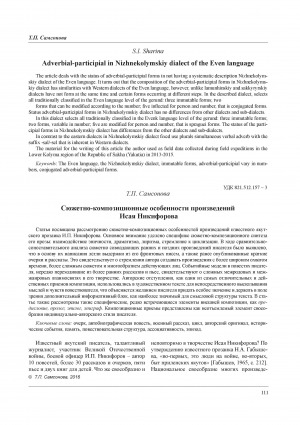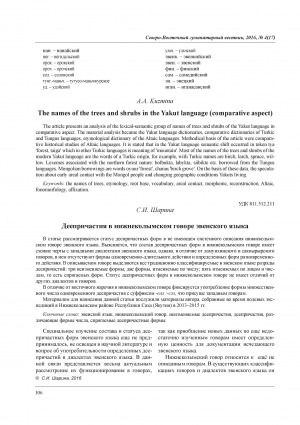
Этнографические этюды (один день из полевой экспедиции в Синьцзян) = Ethnographic etudes (one day from a field expedition in Xinjiang)
Статья в журнале
Русский
391(=512.156)(516)
тувинцы; полевая экспедиция; Синьцзян; озеро Канас; Tuvinians; field expedition; China; Xinjian; Lake Kanas; ethnography
Северо-Восточный гуманитарный вестник. – 2016. – 4 (17) (С. 122-127)
This article is described the field experiment of the author as a part of an ethnographic expedition of the Tuva State University in the Xinjiang Uyghur Autonomous Region, national region of the People's Republic of China in 2011. Within the narration "the culture model" of the Tuva people is in detail told about living conditions of a field expedition. The amazing hospitality of Tuvan villages Horn and Kanas, acquaintance with national cuisine let you plunge into the local atmosphere, imbued with their way of life. Tuvinians living in Chinese Altai, around the Lake Kanas, preserved their ancient culture. There the influence of Russian culture on Chinese Tuvan, is noted as a result of living together in the valley with the Russian Old Believers in the first half of XX century. The main occupation of the Tuvan population in the area of the Lake Kanas is ethnic tourism. Ihe Chinese government strongly supports and subsidizes this direction, at the same time prohibits a traditional activity: hunting and animal husbandry. In the Tuvan villages together inhabited by indigenous nationalities of Xinjiang Kazakhs. Kyrgyz, Uighurs. Dungans and the Mongols (Oirats). Tuvans of China known as Kok-Monchaki and Uriyangkhai. Tuva retained many of the traditional customs of the Turkic peoples of Central Asia, which was lost by the peoples of South and Hast Siberia in the first decades of the Soviet authorities during collectivization.
Ушницкий, В. В. Этнографические этюды (один день из полевой экспедиции в Синьцзян) / В. В. Ушницкий ; Институт гуманитарных исследований и проблем малочисленных народов Севера СО РАН // Северо-Восточный гуманитарный вестник. - 2016, N 4 (17). - С. 122-127.
- 1. Покатилова Надежда Володаровна. Малые жанры в повествовательной системе фольклора = Small genres in a narrative system of folklore
- 2. Иванова Нина Иннокентьевна. "Места памяти" в социолингвистической интерпретации (к постановке проблемы) = "The places of memory" in sociolinguistic interpretation (to statement of a problem)
- 3. Самсонова Тамара Петровна. Сюжетно-композиционные особенности произведений Исая Никифорова = Plot and compositional features of the works of Isai Nikiforov
- 4. Шарина Сардана Ивановна. Деепричастия в нижнеколымском говоре эвенского языка = Adverbial-participial in Nizhnekolymskiy dialect of the Even language
- 5. Кузьмина Ангелина Афанасьевна. Названия деревьев и кустарников в якутском языке (сравнительный аспект) = The names of the trees and shrubs in the Yakut language (comparative aspect)
- 6. Винокурова Надежда Ивановна. Глоссирование как метод репрезентации текстов в якутском языке = Glossing as a method of representing texts written in Yakut
- 7. Иванова Ирина Борисовна. Языковые средства выражения меры объема и веса в якутском языке = Linguistic means of expression measures of volume and weight in the Yakut language
- 8. Ефремов Николай Николаевич. Средства выражения эвиденциальности в якутском языке: формы изъявительного наклонения глагола (в сопоставлении с хакасским языком) = Means of expression of evidentiality in the Yakut language: the forms of the indicative mood of the verb (in comparison to the Khakass language)
- 9. Игнатьева Ванда Борисовна. Чурапча на девяти холмах: топография и нарративы коллективной памяти = Churapcha on nine hills: the topography and narratives of collective memory
- 10. Никитина Саргылана Егоровна. В. В. Никифоров о земском самоуправлении в Якутской области (к 150-летию Василия Васильевича Никифорова) = V. V. Nikiforov about territorial self-government in the Yakut region (the 150 th anniversary of Vasyly Vasilyevich Nikiforov)
- 11. Романова Екатерина Назаровна. Образы национального прошлого и будущего в восприятии якутской эмиграции (память, забвение, идентичность) = Images of the nation's past and future in the perception of the Yakut emigration: (memory, oblivion, identity)
- 12. Томаска Алена Георгиевна. Место памяти и идентичность молодежи Мирнинского района Республики Саха (Якутия) = Place of memory and identity of the youth of the Mirny District of the Sakha Republic (Yakutia)
- 13. Романова Лидия Николаевна. "Воспоминания" А. Я. Уваровского как место памяти = "The memories" of A. Ya. Uvarovskiy as the place for memory (posing of problems)
- 14. Санникова Яна Михайловна. К изучению регионального аспекта развития традиционного хозяйства народов Севера в контексте аграрной политики государства = To study the regional dimension of the traditional economy of Northern Peoples in the context of the agrarian policy of the state
- 15. Антонов Егор Петрович. Вклад С. В. Обручева в геологическое и географическое изучение Якутии = The contribution of S. V. Obruchev in the geological and geographical study of Yakutia
- 16. Васильев Валерий Егорович. Генезис шаманских инструментов народа саха в свете образа матери-зверя у тюрков, монголов и тунгусов = The Genesis of the shamanic tools of the Sakha people in the image of the mother-beast among the Turks, Mongols and Tungus
- 17. Северо-Восточный гуманитарный вестник, 2016, №4 (17)
Войдите в систему, чтобы открыть документ
















